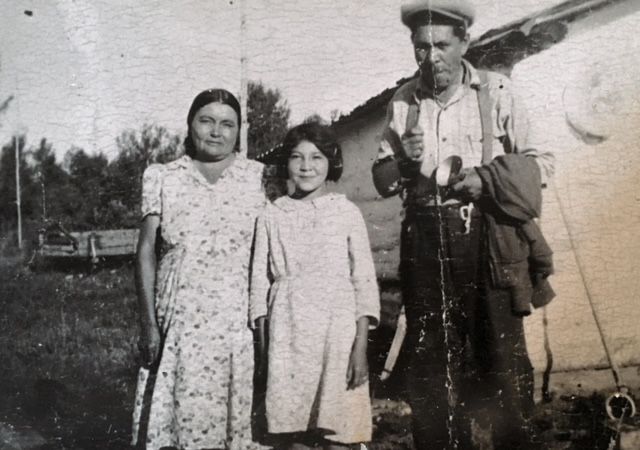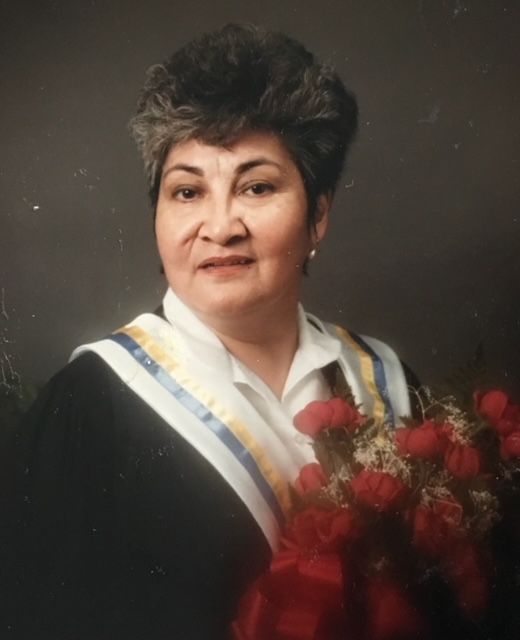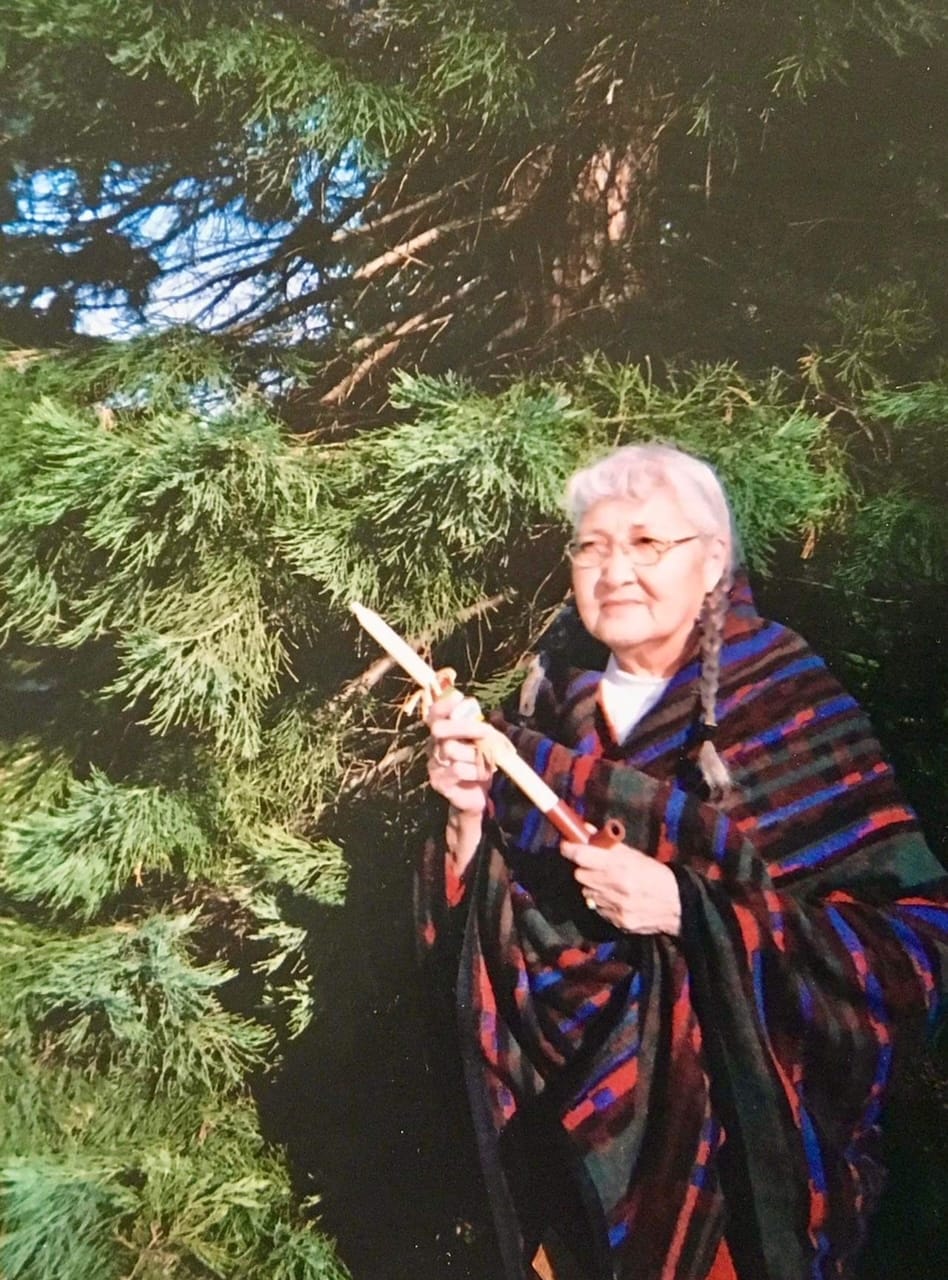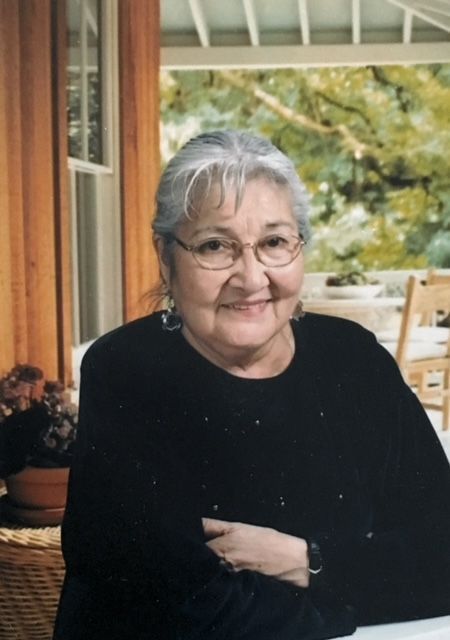Wâpanacâhkos (Morning Star) Helen Piper’s unshakable resolve to further her education despite significant setbacks has inspired a generous gift in her memory to help future Indigenous University of Lethbridge students.
The Helen Piper Award for Indigenous Learners was established by Helen’s daughter, Lynn Petluk, Lynn’s husband, Tim, and their family as a lasting legacy to Helen’s memory. Helen Piper (née Pascal) overcame many challenges in life to become a solid voice advocating for Indigenous Peoples. The award is intended to inspire and encourage Indigenous learners at ULethbridge, and to demonstrate that no obstacle is too great in the pursuit of higher education.
“My mom, Helen, was resilient. She was a hard worker, and she was an inspirational role model to us all,” says Lynn Petluk. “She overcame so much hardship in her life. And she always thought education was the most important thing. She was a lifelong learner.”
Iikaisskini (Low Horn) Dr. Leroy Little Bear (BASc (BA) ’72, DASc ’04), Vice-Provost, Iniskim Indigenous Relations, says Helen was one of those people who you would write a novel about. “And that novel would really revolve around the whole notion of resilience and never giving up,” says Little Bear. “She overcame all those hurdles that were set in her way. If students were to read this ‘novel’ about Helen Piper, who overcame so much and still succeeded, it would really encourage them to do the same.”

At the age of seven, Helen, who was from the Cold Lake First Nations, was separated from her family and taken to St. Anthony’s residential school in Onion Lake, Saskatchewan. Her clothes were taken, her hair was cut short, and her name was replaced with a number. She was not allowed to speak her language. In Fall 1946, when she was 10, she was taken to Blue Quills residential school near St. Paul, Alberta. “Classes” for her included “sewing and cooking” and many children were falling ill.
“She was supposed to start Grade Five when she got tuberculosis,” says Petluk. “It was running rampant at Blue Quills, with records that said ‘sick, sick, sick’ beside so many kids names and then in the notes, it would say Charles Camsell Hospital.” Helen spent over three and a half years in hospital in Edmonton, fighting tuberculosis. It was a difficult life for a young child, but it never broke her spirit. When she recovered at the age of 17, she had a desire to go back to school, but the only option was to return to residential school. “She said never again in my life will I step foot into one of those,” says Petluk. “So, she decided she would get a job instead. That's why she left her education behind for so long.”
Helen was able to keep her language and culture intact and began her adult life with the values she was taught by her parents and Elders. She entered the workforce, then married her husband, Fred Piper, in 1958. The pair started a family and raised six children. Family life was a priority for Helen, who was a devoted mother. “She was very smart, and she wanted her kids to have better and do better,” says Petluk. “She knew education was important and that you could go farther in life, but she didn't have the opportunity or the chance to do it.”
Once the kids were grown, Helen found inspiration from them, including her eldest son Christopher Piper (BMgt ’96), an alumnus of ULethbridge, to return to school. “It was always something that she wanted to do,” says Petluk. At the age of 50, Piper returned to school as a mature student. Her steadfast resolve, tenacious spirit, and support from family and Elders guided her through upgrading high school classes to completing a Management Certificate (Major: Business Enterprises) with a focus on Native studies (currently Indigenous Governance and Business Management) in 1991 at the age of 54. “She finished her Grade 12 and got her education at ULethbridge all within about five years,” says Petluk.


But Helen didn’t slow down there. She continued to pursue learning at Maskwacis Cultural College, obtaining an instructor certificate in Cree language and culture so she could teach. Petluk says Helen would carry the instruction outside of her work, passing on the culture and language to family members and anyone wanting to learn.
Helen dedicated her working life to helping people and was well known for using her voice to advocate for Indigenous Peoples. For many years, she attended the Healing Our Spirit Worldwide conferences where she shared her knowledge as a presenter. She also worked as a First Nations, Métis & Inuit coordinator where she held sharing circles with students and was a great storyteller.
Helen was acknowledged with an Esquao Award in 2004 for her active involvement in preserving and teaching Indigenous culture and for her contributions as a strong Indigenous woman. She was a respected Elder and pipe carrier, often asked to do opening and closing prayers in the Cree language for gatherings of all kinds and helped guide committees asking for Indigenous knowledge. Helen also worked as an Elder for Northwest Children's Services, guided powwows, and conducted eagle feather ceremonies and Sisters in Spirit walks. Her devotion to teaching and sharing Indigenous culture continued until her passing in 2018 at the age of 82.
“She always thought that getting an education was the most important thing a person could do for themselves,” says Petluk. “So, when she passed, I always thought that this would be a really good way to recognize her strength and courage and create a lasting legacy in her memory.”

The Helen Piper Award for Indigenous Learners will provide bursary support for full or part-time continuing undergraduate Indigenous students who have demonstrated participation, contributions or expressed interest in connecting to their culture and heritage through activities of preservation, interpretation or celebration. Two awards of minimum $1,000 annually will be given out, beginning this fall.
Petluk’s son, Duane Piper (BFA/BEd ’07, MEd ’21) is a member of the ULethbridge Senate. Petluk says he told her about The Campaign for Students, with $10 million in matching funds pledged by ULethbridge’s Board of Governors. “When Duane told me that they would match the donations, I thought, this is the perfect time to do it. That was what motivated me to put it in motion—the generosity of ULethbridge, that they would match the donation and then handle it in perpetuity was important.”
Little Bear says the establishment of the Helen Piper Indigenous Learners Award honours her hard work. “She didn't just overcome those hurdles. She went on to be well known,” says Little Bear. It might be the starting point for a student; if they were to hear the full story about Helen Piper, I can see a lot of students realizing ‘I can do that too.’ It's very important to see these kind of role models for our incoming students, so that they can succeed as Helen Piper did.”
Helen Piper wasn’t afraid to speak in front of a crowd and share her culture and language. “She had a voice and she wanted to use it,” says Petluk. Which is why the Helen Piper Indigenous Learners Award was created, to ensure her legacy and her voice continue to inspire future ULethbridge Indigenous students for years to come.
“It was our hope that future generations of Indigenous students would continue moving forward in a positive way and know that their Elders and their ancestors have helped pave the way for them to succeed,” says Petluk.
Dr. Leroy Little Bear, vice-provost, Iniskim Indigenous Relations, shares the impact of Helen Piper's legacy
We are all very proud of our mother, Helen, and of her accomplishments. The Campaign for Students is an opportunity that aligns with our mother’s drive to educate and inspire Indigenous learners.
We are thankful for Tim and Lynn’s generous financial support and the University of Lethbridge that will provide bursary support for generations to come to Indigenous students.
—Tracy Goy (née Piper)
Learn more about giving at ULethbridge and the Board of Governors’ $10 million pledge to match funds for the establishment of endowed student scholarships.
Read the 2022-2023 Donor Impact Report